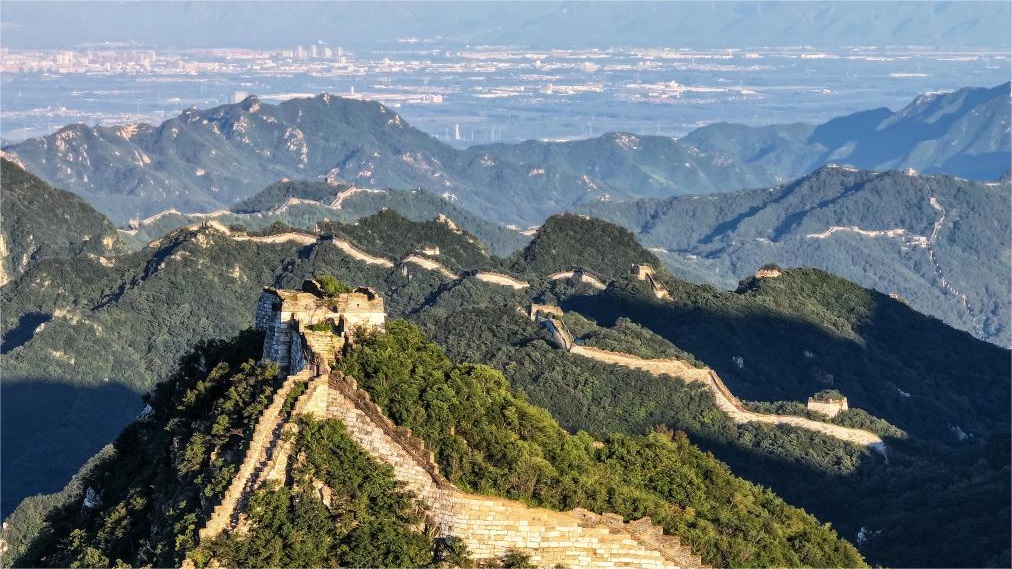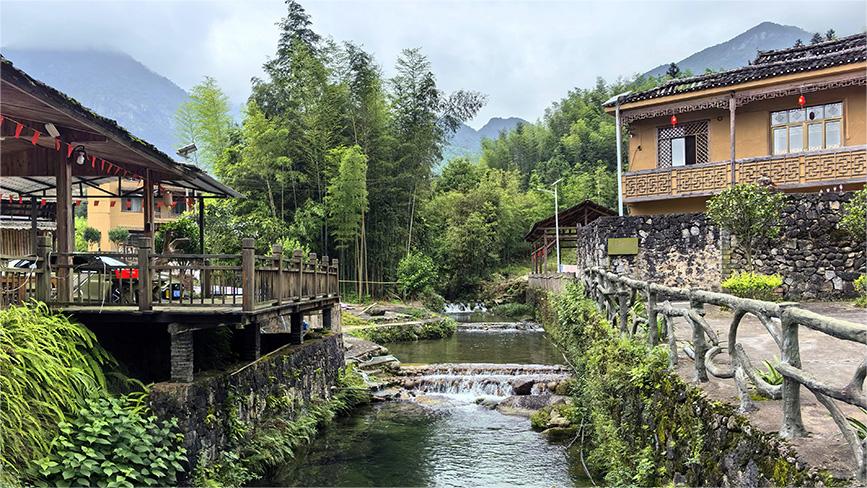Integration of culture, tourism picks up steam

A US tour operator takes photos with Chinese performers wearing ancient folk costumes at the Twelve Hours of Chang'an theme block that vividly reproduces urban life in the Tang Dynasty (618-907), this month. (YANG FEIYUE/CHINA DAILY)
Summer vacationers have been flocking to Langfang, Hebei province, to have a vicarious experience of the past at the Unique Dream of Red Mansion theme park.
Distinctive scene settings and immersive theater performances take visitors back in time after setting foot in the park, which offers artistic renditions of the Qing Dynasty (1644-1911) novel Dream of the Red Chamber, also known as A Dream of Red Mansions, which recounted social life and folk customs of that time.
Since it opened in July last year, the park has staged more than 7,500 shows and attracted more than 1 million visitors, according to the park's administration.
In Xi'an, Shaanxi province, a vivid reproduction of Tang Dynasty (618-907) urban life can be found in the Twelve Hours of Chang'an-themed cultural street, a former shopping mall that also has been a magnet for visitors.
Tourists can shop and watch performances, as well as wine and dine in the historical setting, which is within walking distance of the city's well-known historical landmark, the Giant Wild Goose Pagoda.
Since opening in April 2022, the cultural street has received more than 4 million visitors, with daily traffic exceeding more than 7,000 visits, said Zou Linfeng, chairman of the Shaanxi Cultural Tourism Co, a major investor in the theme area.
The two tourist attractions are among many beneficiaries of the integrated development of culture and tourism, which has been advocated and supported by the country.
The resolution adopted at the third plenary session of the 20th Central Committee of the Communist Party of China in July reaffirmed support for such integration, calling for efforts to promote the full integration of culture and tourism. The resolution also proposed exploring effective mechanisms for integrating culture with science and technology, and stepping up efforts to foster new forms of cultural business.
Rong Xinfeng, chairman of the Badaling Culture and Tourism Group, which is in charge of tourism operations at the Badaling Great Wall scenic area in Beijing's Yanqing district, said, "We will implement the guiding principles of the plenary session into specific projects, promoting the integration of culture and tourism, and better telling the Great Wall's story."
More immersive experiences featuring the Great Wall will be launched, including performances, creative cultural items, and local food, Rong said.
Mei Yi, head of the Jiangxi culture and tourism department, said the resolution adopted at the plenum pointed the way for the culture and tourism industry.
The province in East China will come up with new tourism services, products, and scenes featuring local cultural heritage and ecology, Mei said.
The country has put a premium on the integrated development of culture- and tourism-related industries over the years.
In September 2020, President Xi Jinping pointed out that the culture and tourism industries are inseparably linked, and related parties should adhere to shaping tourism through culture and highlighting culture through tourism.
He made the remarks at a symposium attended by experts and representatives from the fields of education, culture, health, and sports to solicit opinions on socioeconomic development in the 14th Five-Year Plan period (2021-25).
The Ministry of Culture and Tourism released a master plan for developing culture and tourism in 2021 and vowed to continue upgrading the structure of the cultural industry and promoting the use of new technologies and digitalization.
At the 20th National Congress of the CPC in October 2022, Xi, who is also general secretary of the CPC Central Committee and chairman of the Central Military Commission, stressed again that positive interplay between culture and tourism will be encouraged and deeper integration of the two sectors will be advanced.
Wang Linsheng, deputy director of the institute of cultural research at the Beijing Academy of Social Sciences, said the integrated development of culture, tourism, and technology not only can expand the channels for cultural dissemination and enrich the forms of cultural expression, but also enhance the innovation capacity and competitiveness of culture.
Wang pointed out that it is important to enrich the cultural content of tourism products and improve the quality of the tourism experience, so that visitors can deeply appreciate the charm of traditional Chinese culture during their travels.
Integration of culture and tourism has paid huge dividends, not just enhancing people's travel experience but also enabling related sectors to play a prominent role in driving the economy.
According to the Ministry of Culture and Tourism, during the 13th Five-Year Plan (2016-20) period, tourism and related industries accounted for a greater share of the GDP, with the contribution of tourism to the national economy going beyond 10 percent.
Zou, from Shaanxi Cultural Tourism Co., noted that the Twelve Hours of Chang'an culture street has appealed to travelers with immersive Tang Dynasty performances and handicrafts.
"They have breathed new vitality into the culture and tourism market," Zou said.
The street is among major local scenic spots imbued with cultural elements, such as Datang Everbright City, which features Tang Dynasty architecture, and these have helped turn the city of Xi'an into a tourism magnet.
Last year, the city received 278 million travel visits, up 33.1 percent year-on-year, and tourism revenue surged 65 percent to 335 billion yuan ($47 billion), local government sources said.
At the Badaling Great Wall scenic area, new opera performances and poem recitals helped pack in 147,000 inbound travelers as of mid-June, up 81 percent over the same period in 2023, according to Zhai Yanwei, deputy general manager of Badaling Culture and Tourism Group.
"We have gradually built brand influence and attracted a growing number of visitors, and our economic benefits have been considerable," Zhai said.
Experts also hailed the emphasis that the third plenary session's resolution placed on the use of technology in promoting cultural experiences.
Dai Bin, president of the China Tourism Academy, said people's demand for culture and tourism is growing as living standards improve.
To meet the new expectations and requirements of the public for high-quality culture-tourism integration, he said, smart tourism, digital tourism, and technological tourism have transitioned from concepts to reality.
At the Unique Dream of Red Mansion park, the operator has developed the digital travel platform Xiaowa, which can seamlessly accompany travelers throughout their visits.
Before a trip, Xiaowa acts as a travel planner and creates intelligent itineraries. During the trip, it provides real-time smart recommendations based on updated information on waiting times for various performances, dining, and shopping.
"Every visitor can get a personalized schedule and conduct their activities accordingly," said Yu Feng, general manager of the company that operates the park.
In Beijing, at Yuanmingyuan, also known as the Old Summer Palace, digitalization has enhanced the integration of culture and tourism, making the park a big hit among visitors.
"We scanned the site, studied various relics and combined historical documents, samples, and Qing Dynasty engineering practices to digitally restore a large number of buildings," said Qiu Wenzhong, director of administration of the Qing Dynasty emperors' seasonal resort.
In 2023, Yuanmingyuan launched an immersive time capsule that allows visitors to witness the past and present of the park, including its former architectural appearance, and to hear interesting anecdotes and watch reenactments of past scenes.
Dai, the China Tourism Academy president, said he believes there will be an ongoing need for culture-tourism integration to meet emerging demands.
He stressed that technology should be applied to continuously improve culture-tourism products and services, and management should be upgraded to offer effective support.
Photos
Related Stories
- Wetland tourism heats up in China's "ice city"
- Chinese tourists favor less-touristy European destinations for immersive travel
- Experience beauty of Chinese culture in 'Black Myth: Wukong'
- China’s thriving tourism fuels summer spending boom, signals robust growth potential
- Northeast China turns cool resources into summer tourism gold
- Interview: Chinese tourists crucial for Myanmar's tourism industry, says Myanmar's minister
Copyright © 2024 People's Daily Online. All Rights Reserved.









